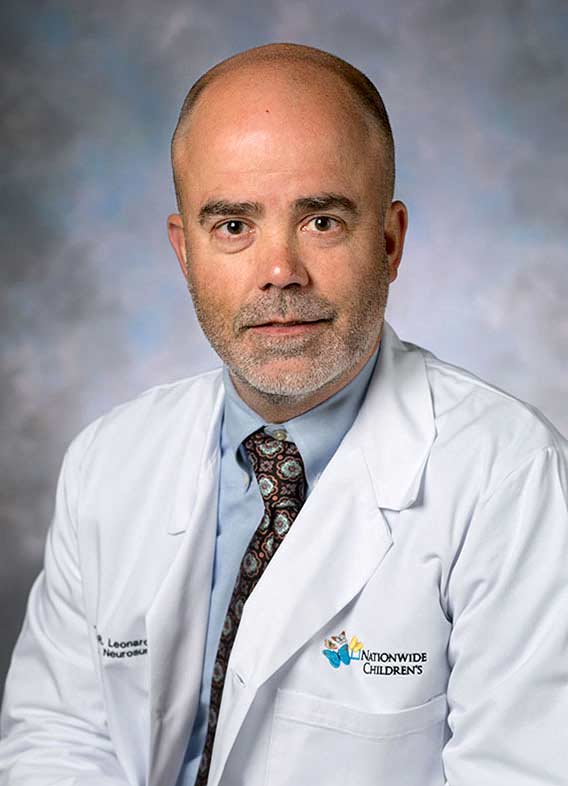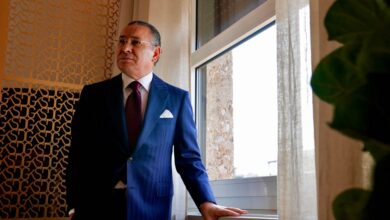Jeffrey R. Leonard

Nationwide Children’s Hospital is one of the largest pediatric hospitals and research institutes in the United States. In recent years, it has consistently been ranked among America’s top 10 children’s hospitals by U.S. News & World Report, the recognized authority on hospital rankings in the United States. Specific to neurology and neurosurgery, the hospital is ranked seventh in the country. “Hospitals” magazine had the chance to interview Jeffrey R. Leonard, MD, chief of Neurosurgery at Nationwide Children’s Hospital, about his program’s dedication to educating the next generation of pediatric neurosurgeons.
Can you give us a brief summary of your career?
I joined Nationwide Children’s Hospital in 2014 as chief of Neurosurgery, and also joined the faculty of The Ohio State University College of Medicine as a professor of Neurological Surgery. I am also a principal investigator in the Center for Childhood Cancer and Blood Diseases, which is part of the Abigail Wexner Research Institute at Nationwide Children’s Hospital.
Before joining Nationwide Children’s Hospital, I was co-director of Pediatric Neurocritical Care and Neuro-Oncology at St. Louis Children’s Hospital, and an associate professor of Neurosurgery and Pediatrics at Washington University School of Medicine.
Can you tell us more about the Pediatric Neurosurgery Fellowship at Nationwide Children’s Hospital?
Nationwide Children’s Hospital offers a one-year Neurosurgery Fellowship that is accredited by the Accreditation Council for Pediatric Neurosurgical Fellowships.
In order to become a board-certified pediatric neurosurgeon in the United States, it is necessary for physicians to do a pediatric fellowship program such as ours, after completing seven years of a neurosurgery training program. Our fellows take part in at least 250 operations during their training.
What is unique about your fellowship program?
The program that we created is well-balanced in all aspects of neurosurgery. It provides fellows with advanced training in endovascular care, epilepsy, deep brain tumors, craniosynostosis, spasticity and more through collaboration with some of the field’s leading experts. Our fellows take part in research, lead a team of residents and nurse practitioners, see patients in both our outpatient clinic and Level-1 trauma center, and learn innovative neurosurgical interventions. We also offer expanded academic and specialty experiences through our own multidisciplinary conferences and lectures as well as through Neurosurgery Grand Rounds at The Ohio State University Wexner Medical Center. At the end of their training, our fellows are able to handle any case that may come to them.
How do participants apply to the program? Do you accept international applicants?
I am the fellowship director, so candidates can reach out to me directly or go through our program website. Any applicant from outside the United States can certainly apply, provided they have neurosurgical training equivalent to what is required in the United States by the American Board of Pediatric Neurological Surgery.
What is the difference between standard neurosurgery and pediatric neurosurgery?
In addition to the required pediatric-specific fellowship training, the neurosurgical problems seen by pediatric neurosurgeons often differ from those commonly seen in adults. Adult neurological diseases usually occur over time, as with cervical degenerative disc disease, spine fractures and other conditions. In children, the problems are more likely to be present from birth, as in kids with congenital birth defects. Many of our patients are very young, so pediatric neurosurgeons must adapt to working on smaller body systems, often using different techniques and pediatric-specific equipment.
How would you define your department’s mission?
Our main goal is to be able to educate people and train the next generation of neurosurgeons, no matter where they are from. We want to help them learn and succeed so that children, now and in the future, here and everywhere, have the benefit of well-trained, experienced neurosurgeons. We also strive to be very transparent in all of our outcomes; we have the lowest infection rates in the United States, and the highest level of success in epilepsy surgery. We work relentlessly to improve our quality of care. Our constant mission is to provide great outcomes, better decision-making — for surgeons and for families — and the best treatments.
To learn more about Nationwide Children’s Hospital and the Pediatric Neurosurgery Fellowship, please visit NationwideChildrens.org/Fellowship-Programs.














